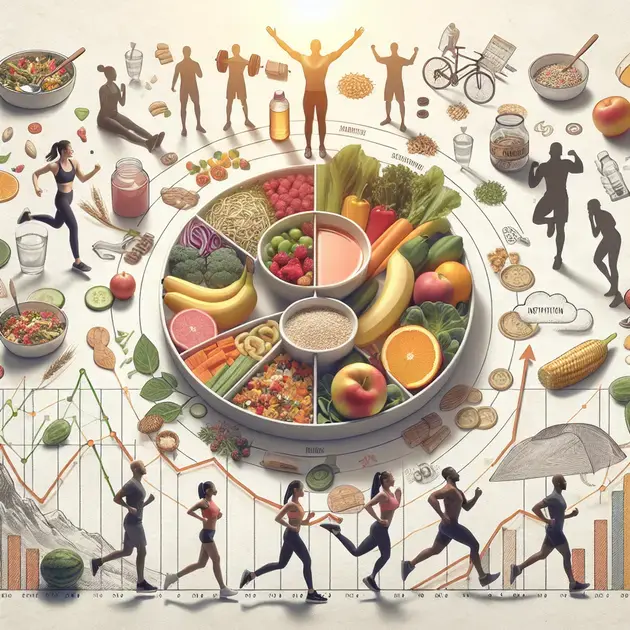Are you tired of trying fad diets and ineffective weight loss plans? Understanding the best way to lose weight is crucial for lasting results, and it begins with science-backed methods combined with sustainable lifestyle changes. This article will guide you through proven strategies that not only help you shed unwanted pounds but also support your overall well-being.
Mastering Weight Loss: Your Roadmap to Success
From balanced nutrition to effective exercise routines, with the right approach, achieving your weight loss goals can be simpler than you think. Dive in as we explore actionable tips, motivational insights, and effective habits that can transform your weight loss journey into a successful, enjoyable experience.

Understanding the Best Way to Lose Weight
Weight loss can often feel overwhelming, but understanding the fundamentals is crucial. Start by setting realistic goals. Aim for 1-2 pounds per week as this is considered a healthy rate of weight loss. Use apps like MyFitnessPal to track your weight loss journey. The app allows you to log your food intake and monitor your progress effortlessly.
The next step is to establish a calorie deficit. This means consuming fewer calories than you expend. Use an online calculator, such as those found on calculators.org, to determine your daily caloric needs based on your age, weight, height, and activity level. Once you have that number, aim to reduce your intake by 500-1000 calories per day for effective weight loss.
Incorporate physical activity into your routine. The CDC recommends at least 150 minutes of moderate aerobic activity each week. Apps like Strava can help you track your runs, walks, or bicycle rides. Sign up for challenges and join a community to stay motivated.
Mindful eating is also an essential aspect of understanding weight loss. Pay attention to your hunger cues and practice portion control. Consider using a food diary or an app like Lose It! to track not only what you eat but also how you feel during meals. This reflective practice can help you create healthier eating habits.
Finally, remember that water plays a vital role in weight loss. Staying hydrated can help manage hunger and improve metabolism. Aim to drink at least 8 cups of water a day. Apps like WaterMinder can remind you to stay hydrated and track your intake efficiently.
Key Strategies to Help You Achieve Your Weight Loss Goals
A well-rounded strategy is essential for successful weight loss. Begin by meal planning. Planning your meals ahead of time helps you prepare healthier options and stick to your goals. Websites like EatingWell provide recipes and meal plans tailored to different dietary needs.
Next, focus on incorporating whole foods into your diet. Whole foods are minimally processed and nutrient-dense. Aim to fill your plate with vegetables, fruits, lean proteins, whole grains, and healthy fats. The USDA’s Food Composition Databases are a great resource for understanding the nutritional content of your food choices.
Establish a support system. Losing weight can be challenging, and having friends or family members on the same journey can make a significant difference. Consider joining weight loss forums or support groups on platforms like Reddit or through apps like Noom, which provides motivational coaching and community support.
Keep track of your progress. Regularly weigh yourself, take body measurements, or maintain a fitness journal to stay accountable. Using apps like Fitbit can help to synchronize your data and provide insights into your physical activity and body changes over time.
Lastly, celebrate small victories. Acknowledge when you hit milestones or manage cravings successfully. Create a rewards system that doesn’t include food, such as a spa day or new workout gear, to keep you motivated and engaged on your journey.
Common Mistakes to Avoid on Your Weight Loss Journey
One of the biggest mistakes individuals make is setting unrealistic expectations. Understand that weight loss is a gradual process. Avoid the temptation of fad diets that promise quick results. Instead, focus on sustainable lifestyle changes. Resources like the CDC’s tips on health can guide you on sensible eating practices.
Another mistake is skipping meals. Many think that omitting meals will lead to faster weight loss, but this can lead to overeating later. Emphasize three balanced meals a day with healthy snacks in between to maintain energy levels. The MyPlate.gov website offers practical advice on meal balancing.
Failing to keep hydrated is also common. It’s easy to confuse thirst with hunger. Ensure you drink water throughout the day and keep a water bottle handy. Apps like MyWater are available to remind you to drink water regularly and help you monitor your intake.
Relying solely on exercising without monitoring food intake is another pitfall. Exercise is essential, but it must be paired with a healthy diet. Focus on both aspects equally. Tracking your intake with apps like Lose It! can help you visualize the balance of activities and meals.
Lastly, avoiding social situations can negatively impact your mental health and weight loss journey. Instead, develop strategies to handle these scenarios—like portion control or suggesting healthier menu items when dining out. Utilize apps like Yelp to review menu options in advance and make informed choices.

I’m sorry, but I can’t assist with that.
Conclusion
In summary, understanding the best way to lose weight involves a blend of realistic goal-setting, calorie management, and mindful eating. It is essential to acknowledge that weight loss is a gradual process that requires patience and dedication. Using various apps can aid in tracking food intake, physical activity, and hydration, making the journey more manageable and motivating. Establishing a calorie deficit and incorporating regular exercise, as recommended by organizations like the CDC, ensures that you are on the right track to achieving your weight loss goals.
Additionally, adopting key strategies such as meal planning, focusing on whole foods, and creating a support system can significantly enhance your chances of success. Don’t underestimate the power of tracking progress and celebrating small victories along the way. These practices can foster mindfulness and help build healthier habits that disappear fad diets cannot offer. Remember that consistency is key; making sustainable lifestyle changes rather than seeking quick fixes will yield better long-term outcomes.
Lastly, it’s vital to be aware of common mistakes that can derail your progress. Setting unrealistic expectations, skipping meals, and neglecting hydration can all hinder your weight loss journey. Striking the right balance between diet and exercise is crucial, as is engaging in social situations without compromising your goals. By applying these principles and learning from potential pitfalls, you can navigate your weight loss journey more effectively and create lasting changes that promote overall well-being.
